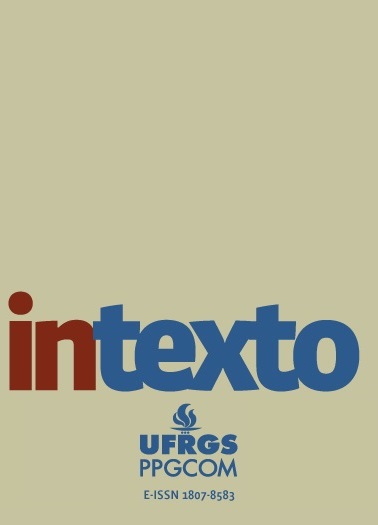Communication and Semiotics: zones of convergence and shared challenges in the study of social sense construction
DOI:
https://doi.org/10.19132/1807-8583202152.98958Keywords:
Communication. Semiotics. Social Speech. Sign. EnunciationAbstract
This article proposes to present, in a descriptive-analytical dimension, the dialogue between Communication and Semiotics, through the bias of the theory of social discursivity of Eliseo Verón. By treating discourse as a spatiotemporal materiality of meaning, Verón proposed a theoretical and methodological approach to the study of media products from the perspective of the sign in Charles Sanders Peirce and the concept of enunciation. The text indicates, through bibliographic study, that the Theory of Social Discourses encompasses the investigation of the effects of meaning on media enunciations, surpassing mechanistic approaches. Finally, it points out that Communication and Semiotics share an intersection zone constituted by concerns with the social production of meaning and the construction of reality. In this context, the circulation modalities of the current mediatized society draw perspectives and challenges to the interface between them.
Downloads
References
BENVENISTE, Émile. Problèmes de linguistique générale. 2. Paris: Gallimard, 1974.
BOUTAUD, Jean-Jacques.; VERON, Eliseo. Sémiotique ouverte: itinéraires sémiotiques en communication. Paris: Lavoisier, 2007.
BRAGA, María Laura. Eliseo Verón n. 1935. In.: ZECHETTO, Victorino (org.). Seis Semiólogos en busca del lector. Buenos Aires: La Crujía, 2008. p. 241-283.
CHARAUDEAU, Patrick; MAINGUENEAU, Dominique. Dicionário de análise do discurso. Coord. da Trad. Fabiana Komesu São Paulo: Contexto, 2004.
CULIOLI, A. et al., La théorie de Antoine Culioli - ouvertures et incidentes. Paris: Ophrys, 1992.
DUCROT, Oswald. O dizer e o dito. Trad. Eduardo Guimarães. Campinas, SP: Pontes, 1987.
ECO, Umberto. Lector in fabula. São Paulo: Ed. Perspectiva, 2002.
FAUSTO NETO, Antonio; FERREIRA, Jairo; BRAGA, José Luiz; GOMES, Pedro. Midiatização e processos sociais na América Latina. São Paulo: Paulus, 2008.
FAUSTO NETO, Antonio. Trajetos do corpo de uma mulher. In: CASTRO, Paulo César (org.). Circulação Discursiva: entre produção e reconhecimento. Maceió, Alagoas: EDUFAL, 2017.
FAUSTO NETO, Antonio. Circulação: trajetos conceituais. Rizoma, Santa Cruz do Sul, v. 6, n. 2, p. 8, dezembro, 2018.
FERREIRA, Giovandro Marcus e ANDRADE, Ivanise Hilbig de. Percurso da reflexão sobre a mediatização nos estudos de Eliseo Verón. In: COLÓQUIO BRASIL-ARGENTINA DE CIÊNCIAS DA COMUNICAÇÃO, 5., 2015, Rio de Janeiro. Anais [...]. Rio de Janeiro, 2015.
FLOCH, Jean-Marie. Sémiotique, Marketing et Communication. Paris: PUF, 1990.
FRANÇA, Vera Veiga. O objeto da Comunicação/ A Comunicação do objeto. In: HOHLFELDT, A.; MARTINO, Luiz Cláudio.; FRANÇA, Vera Veiga (org.). Teorias da Comunicação: conceitos, escolas e tendências. Petrópolis: Vozes, 2001.
HJARVARD, Stig. A midiatização da cultura e da sociedade, Editora Unisinos, São Leopoldo, 2013.
HOHLFELDT, A.; MARTINO, Luiz Cláudio.; FRANÇA, Vera Veiga (org.). Teorias da Comunicação: conceitos, escolas e tendências. Petrópolis: Vozes, 2001.
LUNDBY, Knut (ed.). Mediatization: concept, changes, consequences. New York: Peter Lang, 2009.
LUNDBY, Knut (ed.). Mediatization of communication. Boston: De Gruyter, 2014. v. 21. (Handbooks of Communication Science)
HJARVARD, Stig. A midiatização da cultura e da sociedade. São Leopoldo: Editora Unisinos, 2013.
MACHADO, Irene. O ponto de vista semiótico. In: HOHLFELDT, A.; MARTINO, Luiz Cláudio.; FRANÇA, Vera Veiga (org.). Teorias da Comunicação: conceitos, escolas e tendências. Petrópolis: Vozes, 2001.
MARTINO, Luiz Cláudio. Escritos sobre Epistemologia da Comunicação. Porto Alegre: Sulina, 2017.
PEIRCE, Charles Sanders. Semiótica. 4 ed. São Paulo: Perspectiva, 2008. (Estudos, 46)
SANTAELLA, Lúcia. O que é Semiótica. São Paulo: Brasiliense, 2007 (Coleção Primeiros Passos, 103)
SANTAELLA, Lúcia. A Teoria geral dos signos. São Paulo: Ática: 1995.
SAUSSURE, Ferdinand de. Curso de linguística geral. São Paulo: Cultrix, 2004.
VERÓN, Eliseo. Il est lá, je ele vois, il me parle. Communicationsn, Paris, n. 38, 1983b.
VERÓN, Eliseo. L'analyse du contrat de lecture: une nouvele methode pour lês études de positionnement des supports presse, Les Médias. Expériences, recherches actuelles, applications. Paris: IREP, 1985. p. 203-229.
VERÓN, Eliseo. Fragmentos de um tecido. São Leopoldo: Editora Unisinos, 2004.
VERÓN, Eliseo. La sémiosis sociale. Fragments d’une théorie de la discursivité. Paris: Presses Universitaires de Vincennes, 1987.
VERÓN, Eliseo. La semiosis social, 2: ideas, momentos, interpretantes. Buenos Aires: Paidós, 2013.
VERÓN, Eliseo. Teoria da midiatização: uma perspectiva semioantropológica e algumas de suas consequências. Matrizes, São Paulo, v. 8, n. 1, p. 13-191. jan./jun. 2014.
VERÓN, Eliseo. Mediatización, comunicación política y mutaciones de la democracia. Semiosfera, [s.l.], n. 2, p. 5-36, 1994.
VERÓN, Eliseo. Médiatisation du politique. Stratégies, acteurs et construction des collectifs. Hermès, [s.l.], v. 3, n. 17-18, p. 201-214, 1995.
VERÓN, Eliseo. Quand lire c’est faire: l’énonciation das le discours de la presse écrite. Semiotique II. Paris: IREP, 1983a, p. 33-56.
WOLF, Mauro. Teorias da Comunicação de massa. São Paulo: Martins Fontes, 2003.
ZECCHETTO, Victorino. Charles Sanders Peirce 1839/1914. In: ZECHETTO, Victorino (org.). Seis Semiólogos en busca del lector. Buenos Aires: La Crujía, 2008. p.41-79.
Downloads
Published
How to Cite
Issue
Section
License
Copyright (c) 2021 Claudiane Oliveira Carvalho Sampaio

This work is licensed under a Creative Commons Attribution-NonCommercial 4.0 International License.
The copyright of works published in this journal belong to the authors, and the right of first publication is conceded to the journal. Due to the journal being of open access, the articles are of free use in research, educational and non-commercial activities.
Therefore, the journal uses the License Creative Commons Attribution (CC BY-NC 4.0), which allows sharing of work with acknowledgment of authorship.
Self-archiving (repository policy): authors are allowed to deposit all versions of their work in institutional or thematic repositories without embargo. It is requested, whenever possible, that the full bibliographic reference of the version published in Intexto (including the DOI link) be added to the archived text.
Intexto does not charge any article processing fees (article processing charge).















